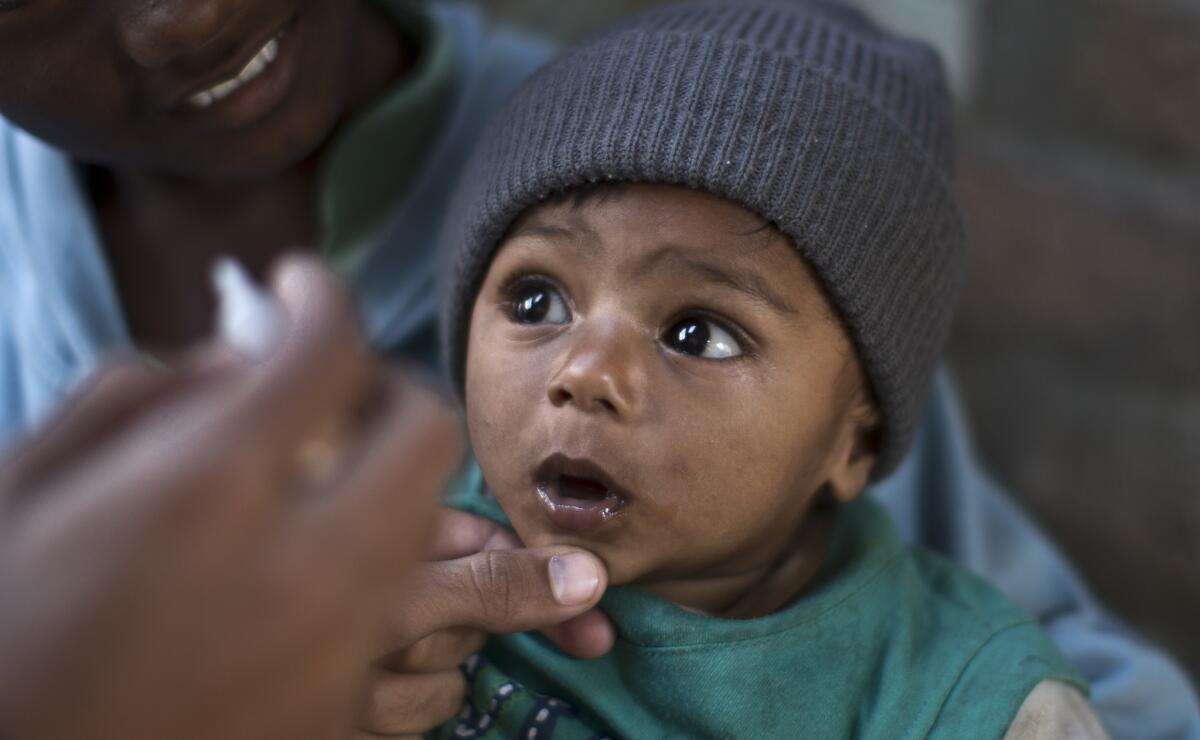Polio worker, 2 police officers slain in Pakistan

- Share via
PESHAWAR, Pakistan -- Two policemen and a polio worker were killed by gunmen in separate incidents in restive northwest Pakistan on Friday, officials said.
In the first case, suspected militants fired at two policemen reportedly on their way to guard polio vaccination workers in the Swabi district of Khyber-Pakhtunkhwa province, police said. One of the policemen, Ijaz Ali, was killed immediately, while the second, Iftikhar Ali, died a few hours later at a hospital. Both were shot in the head, said an officer who saw their bodies.
Swabi is the hometown of Khalid Sheik Haqqani, a senior Taliban official.
In the second case, unidentified gunmen on a motorcycle killed polio vaccination team member Muhammad Yousaf Afridi near his house in the Jamrud area of the Kyber tribal region adjoining Peshawar. He was killed as was returning from dispensing oral polio drops to children, said Muhammad Asif, a local official.
In recent months, polio vaccination workers have come under growing threat sparked in part, analysts say, by a doctor’s attempt on behalf of the CIA to obtain DNA from Al Qaeda leader Osama bin Laden’s family using a vaccination campaign as a pretext.
In a country where distrust of foreign intelligence services runs particularly deep, the doctor, Shakil Afridi, was sentenced in May 2012 to 33 years in prison for treason. That sentence was overturned in August and a retrial ordered, but in November he was charged with murder in the death of a patient he treated eight years ago.
No one immediately claimed responsibility for the attacks. But militant Islamists over the past decade have targeted vaccinators, accusing them of secretly attempting to spread AIDS and sterilize Muslims. Among those strongly opposed to the project is Mullah Fazlullah, who was recently appointed to head the Taliban after his predecessor was killed in a drone strike.
In June 2012, the Taliban announced its opposition to polio vaccination efforts. Since then, there have been more than two dozen deaths involving vaccination teams and their security details.
A World Health Organization official, who requested anonymity given that he wasn’t authorized to speak, said the health worker Yousaf’s family had enemies in the area, adding that his elder brother was killed by adversaries about 18 months ago.
“We are not sure whether he was killed because of a personal vendetta or because he was conducting the anti-polio drive,” the official said.
He added that this was the second day of a three-day vaccination drive across the tribal region, with the exception of North and South Waziristan, where militants had banned anyone from administering polio drops in protest over CIA drone strikes.
Health workers have come tantalizingly close to eradicating the crippling disease worldwide, but difficulties faced vaccinating children in conflict areas have made the goal elusive. In March, the United Nations said an estimated 240,000 children across Pakistan’s tribal areas have missed vaccinations since July due to security concerns and lax oversight.
The U.N. halted its Pakistan vaccination program in December 2012 after nine vaccination team members were killed, but resumed the effort a month later.
Officials said Friday that approximately 2,000 mobile anti-polio teams had been involved in the vaccination drive in tribal areas adjacent to Afghanistan. These will continue despite the latest attack, they said, but better security in high-risk areas will be sought.
Health workers are hoping an edict by a noted religious scholar with ties to insurgents will help ease suspicion and stem the disease. Maulana Sami-ul-Haq, known as the “Father of the Taliban” for founding a seminary that helped launch the movement in the 1990s, on Wednesday issued a fatwa calling on parents to immunize their children against polio and other fatal diseases, activities he said complied with Islamic law.
Pakistan has registered 72 polio cases so far this year, according to the World Health Organization, compared with 58 in 2012. It is one of three countries along with Afghanistan and Nigeria where the polio virus remains endemic.
Populous India next door -- which in January 2011 saw its last case of “wild” polio, as opposed to those rare cases caused by the actual vaccine -- is wary of reinfection from Pakistan and Afghanistan. In 2009, it reported 741 cases, the most in the world, down from 150,000 in 1985.
On Wednesday, New Delhi announced that travelers from Pakistan and other polio-affected countries would have to furnish proof of a vaccination at least six months before in order to enter the country.
Polio, virtually unheard of these days in developed countries, is extremely contagious and spreads through contaminated water or food, attacking the central nervous system and leading to paralysis and even death.
Twitter: @MarkMagnier
Special correspondent Ali reported from Peshawar and staff writer Magnier from New Delhi.
More to Read
Sign up for Essential California
The most important California stories and recommendations in your inbox every morning.
You may occasionally receive promotional content from the Los Angeles Times.










